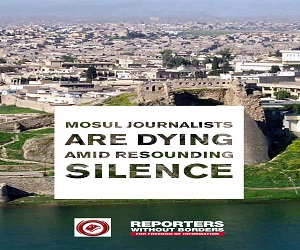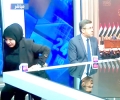The Journalistic Freedoms Observatory expresses its strong concern regarding the decision of the Interior Ministry, and its remarks about the prohibition of journalists from covering on the scene of explosion events, on the pretext of protecting journalist from secondary explosions that could happen at the sites where violence occurs.
The director of the National Command Center in the Ministry of the Interior, Abd al Karim Khalaf, had said that his ministry, effective immediately, would forbid media workers from approaching sites of violent events, for security reasons and other humanitarian reasons, and to protect them, fearing (further) explosions that might target the site another time, which could place them in danger.
The Journalistic Freedoms Observatory confirms here that no such case has ever been indicated to it, since there is no precedent case of a journalist’s killing in a dual explosion -- with the exception of the events of the explosion that resulted from a strike on the part of the American forces -- especially since journalists do not travel to sites of the (bombing) events except after the passing of enough time, because the areas, quite simply, are encircled by Iraqi security forces who, in most cases, do not permit the entrance of the area, until after an hour has passed since the explosion, and in other cases after more than an hour.
What may increase the concern of the Journalistic Freedoms Observatory about this decision, are the remarks of the director of the National Command Center in the Ministry of the Interior to the AFP agency on the subject of the prohibition of media workers to cover these events, who said, “We generally send a group of investigators to the sites of the explosions to verify the evidence and remove it from the site to avoid tampering with the evidence of this type, which helps us reach the perpetrators”.
The Journalistic Freedoms Observatory notes here that to understand the role of the inspectors is one thing, and to forbid journalists from performing their professional duty, and to interfere with them is another, because this decision simply provides an covering rubric for the security forces that they can mistreat the media workers and forbid them from discovering the realities, under the pretext of (the security forces’) gathering evidence and finding the realities.
And perhaps what is most conspicuous in these remarks is that the condition of journalists, and tampering (with evidence) are mentioned in the same framework -- and this is not an unintended error the way the decision is constructed, because it was released by the competent agency that is required to distinguish precisely between media work and tampering. So what is the value of media coverage when journalists are forbidden from getting to the site of the events? And how is it possible transparently to measure the security performance if journalists depend only on the remarks of officials after the event?
Already the Iraqi government has decided to include journalists and media foundations under the counter-terrorism law, as the Iraqi parliament has decided to issue orders and recommendations, one of which forbade journalists to enter the convention center where the parliament holds most of is press conferences, and another raised the recommendation on the part of the presidency that the Iraqi government audit Iraqi media institutions, and this is what made other government agencies publish orders limiting press freedom in the provinces of Basra, Mosul, and Diwaniya, in addition to other interference by government institutions in the work of the press.
It is not a small number of Iraqi journalists who have informed the Journalistic Freedoms Observatory that they consider the decision as a way to narrow their coverage of events in the field, which is among the most important of their daily methods. (Journalists also) expressed their concern that this decision could form a legal cover for the security apparatus to mistreat journalists especially in tense areas, or what are known as restive (‘hot’) areas, in which the journalists are most times accused of working on the side of armed groups.
And building on that, the JFO demands that the Iraqi prime minister, Sayyid Nuri al-Maliki, reverse the application of the counter-terrorism law to journalists and their media institutions, to limit the decisions that limit the press freedoms in Iraq, and to order the cancellation of the decision of the interior ministry, as well as to show enough flexibility with journalists and to help them in revealing the realities (in Iraq) so that the world knows the extent of criminality and terrorism that Iraq is witnessing -- it seems that the Iraqi security forces ignored this aspect, it despite its importance.






.jpg)









